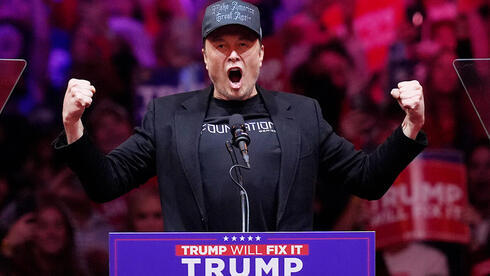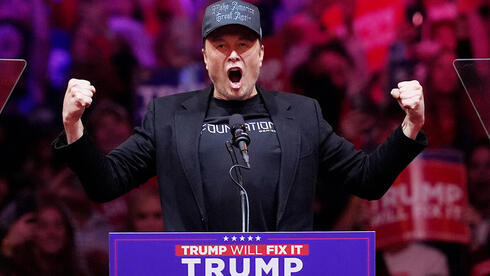
The tech mogul who could reshape government: Musk's role in Trump’s new era
Musk’s potential as Trump’s "Czar of Efficiency" could change the landscape of government regulation and privatization in America.
Even though Donald Trump is not one to usually share the spotlight, in his victory speech on the night of November 5, he unusually devoted four whole minutes to another person—Elon Musk. "Let me tell you something, we have a new star. A star is born—Elon," Trump said at the victory rally. "He is a very special guy. He is a super genius. We need to protect our geniuses; we don’t have that many of them," he concluded.
Trump has a lot to be thankful for. In recent weeks, the richest man in the world has fully mobilized for Trump's second election bid. Musk poured huge amounts of capital into Trump’s campaign, recruited an entire social network to spread his messages, and devoted a lot of his personal time, hopping from one support rally to another. With $134 million in donations to the Trump campaign and thousands of posts later, both Musk and Trump can be pleased. Not only did Trump manage to return to the White House, avoiding penalties for criminal convictions and prosecution on other charges, but Musk himself is expected to gain a significant foothold in the new administration. At least one position has already been offered to him—and he has agreed to accept it: Czar of Efficiency. This extraordinary role, tailor-made for him, is designed to influence the structure, budget, and activities of various regulatory authorities, which, not coincidentally, also oversee his companies.
In the spirit of the role he was offered, Musk supported the Trump campaign methodically and efficiently. Half a year after purchasing Twitter for $44 billion, Musk fired about 80% of the workforce, including all of the company’s trust and safety teams. He then harnessed the remaining employees—the most loyal of them all—to turn Twitter into X and design its algorithm in his image.
According to an investigation by The New York Times, Musk posted more than 3,000 times in the last month on the social network he owns. Musk’s posts receive extraordinary exposure among the hundreds of millions of users, partly because he has over 202 million followers. Another investigation found that Musk ensured X’s algorithm was manipulated so that his posts, as well as those of his affiliated companies, received increased exposure and promotion—twice the reach compared to a year earlier. According to an investigation by The Wall Street Journal, X’s algorithm favors political content, especially pro-Trump content. The platform also encourages every new user, at first, to follow Musk.
Operates without control mechanisms
In such a scenario, Musk has turned himself into a machine for distributing messages—none of them conciliatory or gentle. Most concern casting doubt on the integrity of elections, spreading conspiracy theories about his opponent Kamala Harris, as well as about immigrants, women, and election observers. “If Trump is not elected, this will be the last election,” Musk shared on September 29 in a post that has been viewed more than 103 million times and republished almost 180,000 times.
What Musk promised Twitter users is that X would be "the town square" and a bastion for freedom of expression, "free from political influence." In practice, he has personally turned X into a hotbed of right-wing conspiracy theories. He did all this without any control or accountability mechanisms, even though he knew that over half of news consumers get at least part of their news from social networks. It is also known that at least Trump recognized how important Musk’s activity was as a tool to control the news agenda and spread certain narratives. For example, after being banned from Twitter for inciting violence in January 2021, Trump founded a competing social network, Truth Social, to create a similar platform for himself.
The establishment of a competing social network, which essentially replicates Twitter, did not prevent the two giants from aligning in recent months. Their connection is deep for a variety of reasons. Both enjoy a fan base that follows them like a cult, support that enables them to behave wildly, as if without consequences. In addition, both suffer from excessive self-confidence and disdain for norms and institutions. The demon of their lives is authority and control, and for some reason, they both believe that concentrating power in their hands makes sense, and that their personal interests align perfectly with the public interest.
For example, when someone claimed that Musk’s intention to cut a third of the government budget would sabotage aid programs in areas like food, housing, and health—leading to a financial market "slump"—Musk responded, “Sounds about right.” Of course, a market crash won’t make Musk or Trump starve, but why should it matter to them?
An approach reserved for fascists
The idea that their interests are completely aligned with those of the public can stem from two reasons: either they believe their worldview is the most correct one for hundreds of millions of people—a conceit held by many politicians and capitalists; or they believe that what is good for them is good for everyone else, a merging of interests typical of fascists who are unable to separate themselves from the public good. If this sounds like an exaggeration, remember Trump’s promise that he would be “dictator for a day” in his second term, and Musk’s self-proclamation as the “technoking.”
Even if Musk does not officially join the White House, the goal and strategy are entirely clear: cutting $2 trillion from the $6.75 trillion government budget, through the dismantling of government services, privatization, and the outsourcing of state affairs. Not bad for entrepreneurs like Musk, whose companies would gain more opportunities for huge government contracts. Shares of Tesla, Musk's only publicly traded company, jumped 13% after Trump’s victory, reflecting the general sentiment. But the full capital for Musk’s investment portfolio has yet to materialize.
It is difficult to estimate the exact amount, but when considering the scope of Musk’s business activity that depends on American regulators, these are not small sums. Here is a decidedly partial list: NASA decides whether and what subsidies and contracts to grant to SpaceX; the Federal Aviation Administration (FAA) grants approvals for rocket launches to deploy Starlink satellites; the Department of Transportation oversees subsidies for electric vehicles; the Food and Drug Administration (FDA) decides whether Musk’s startup, Neuralink, can implant chips in human brains; and the Federal Trade Commission oversees the social network X. When Trump promises that, if elected, "the United States will go to Mars," he likely means Musk’s company will get the job.
The interests are significant, and the activity to promote them has been accordingly.















